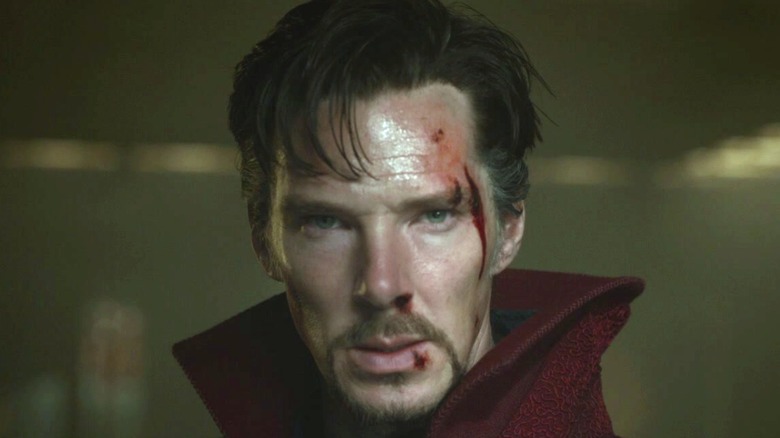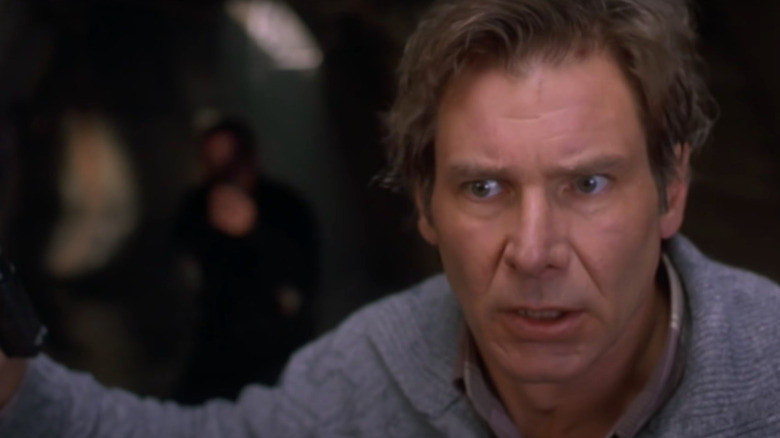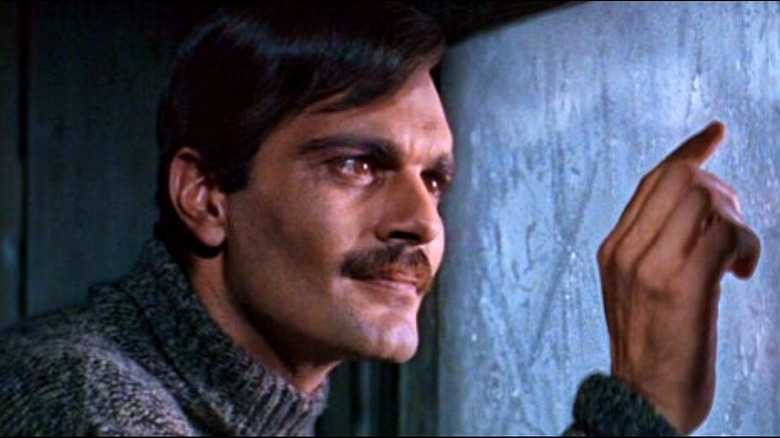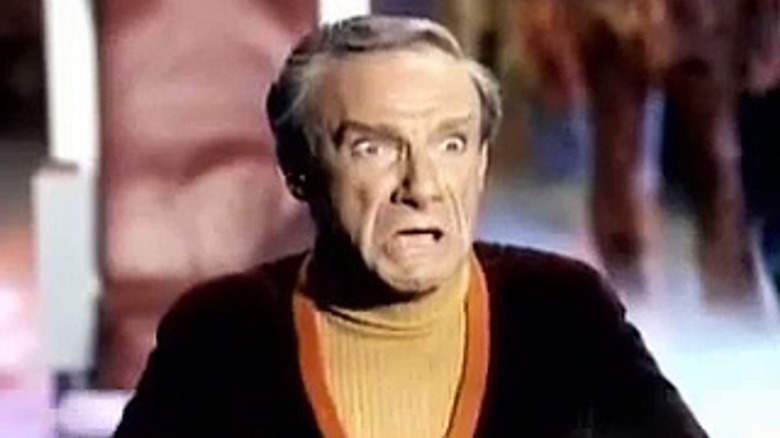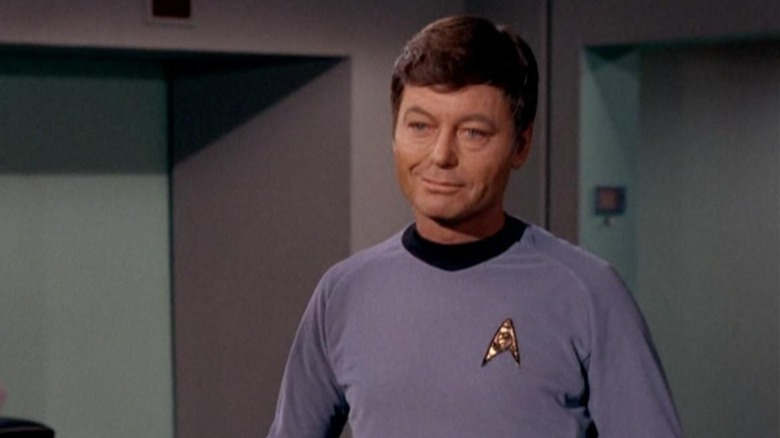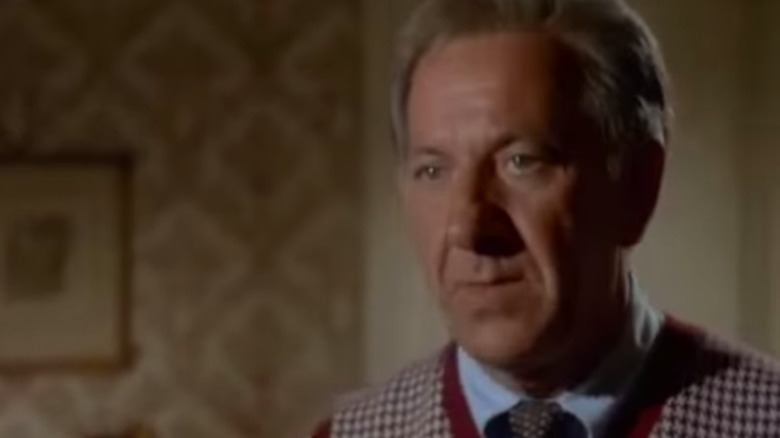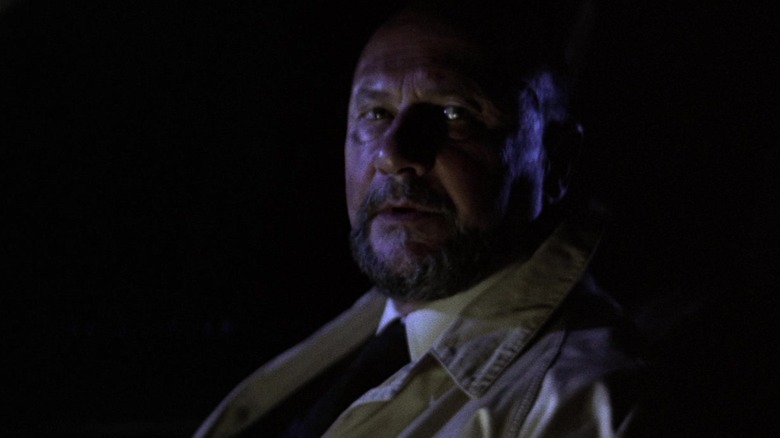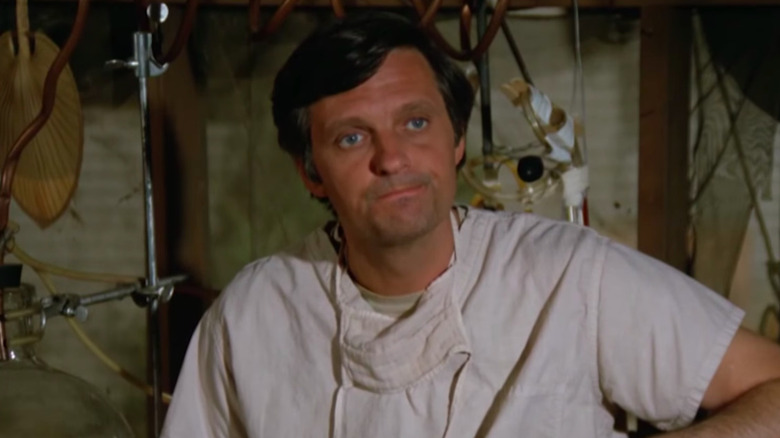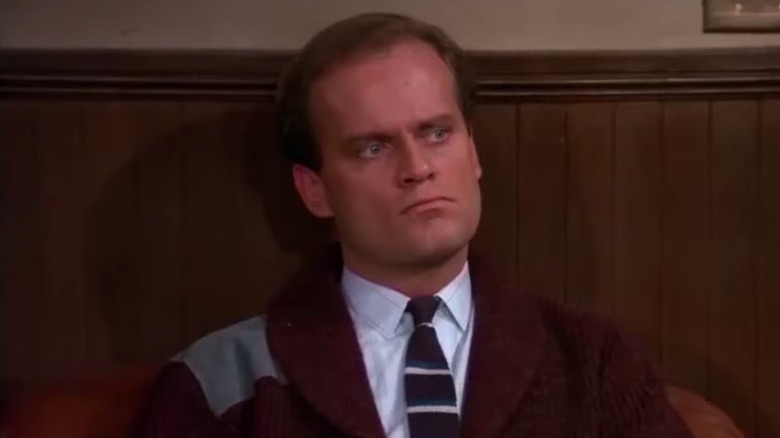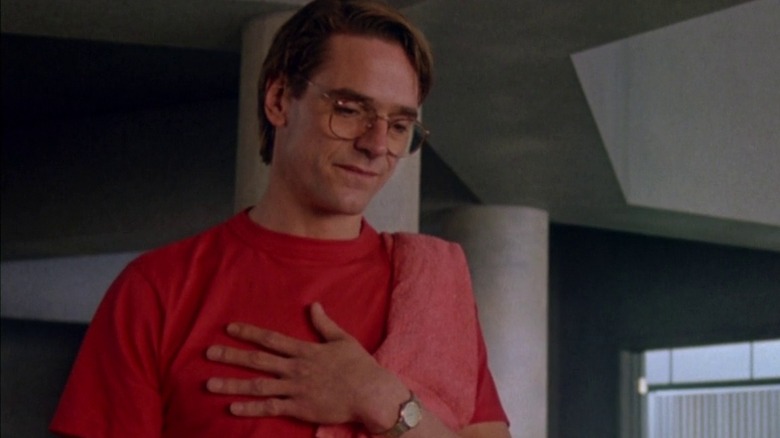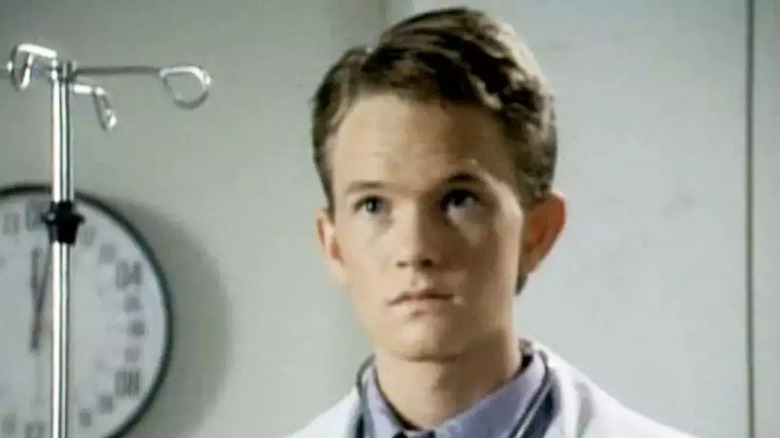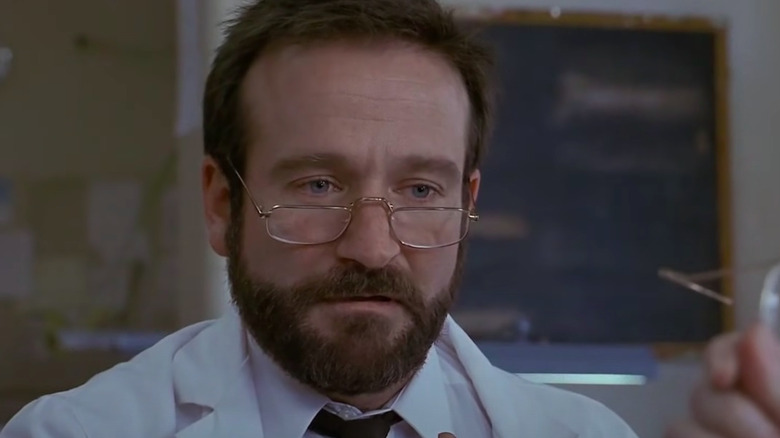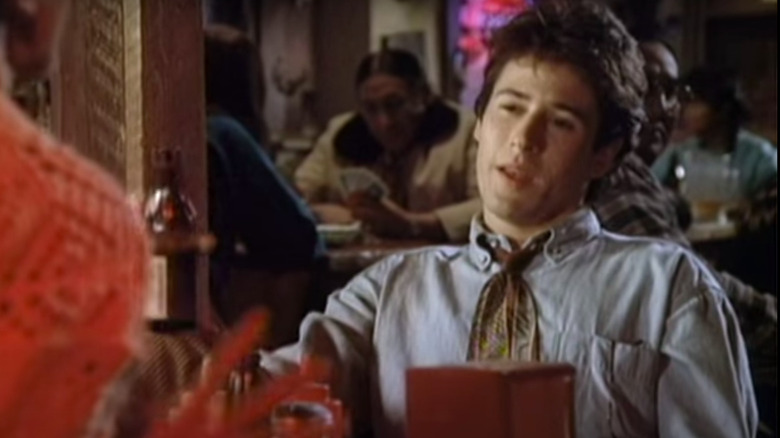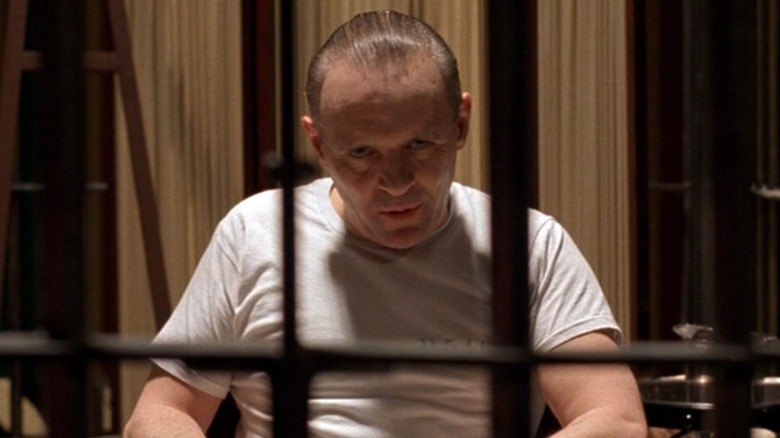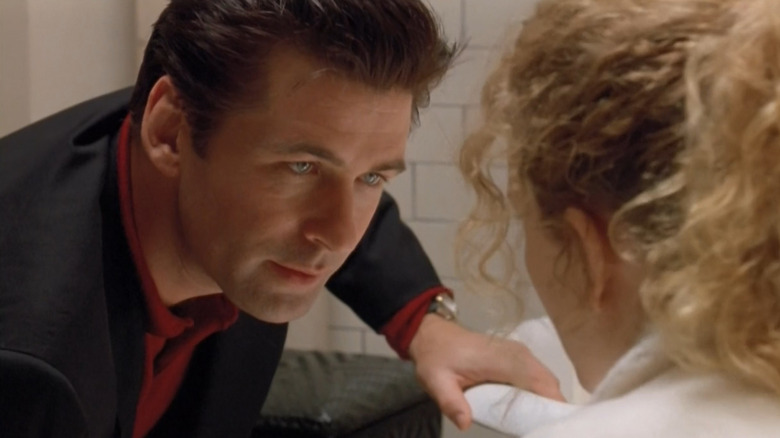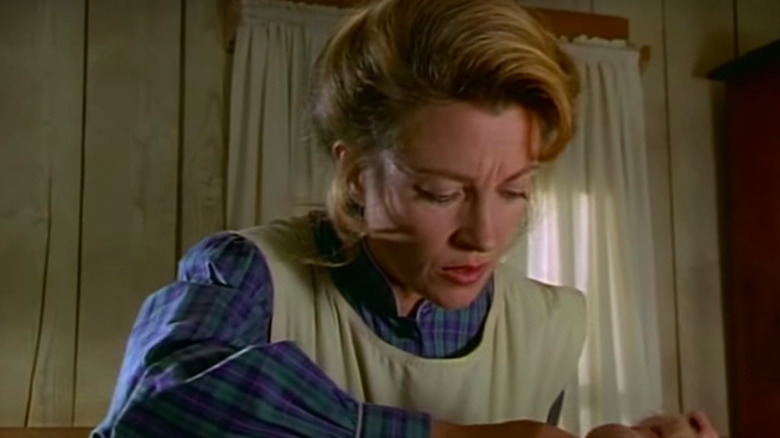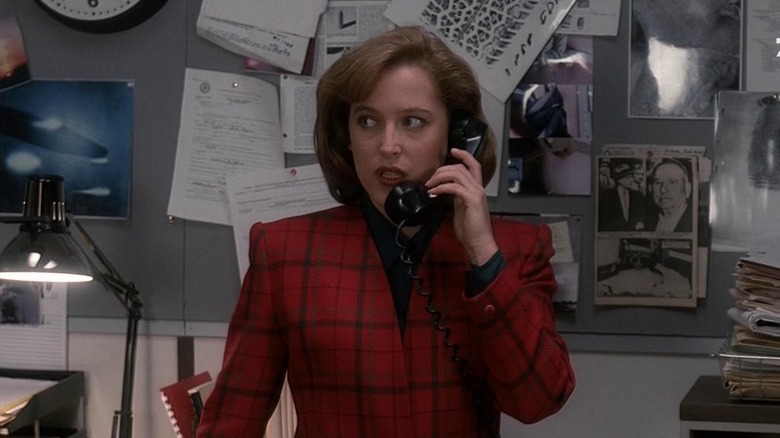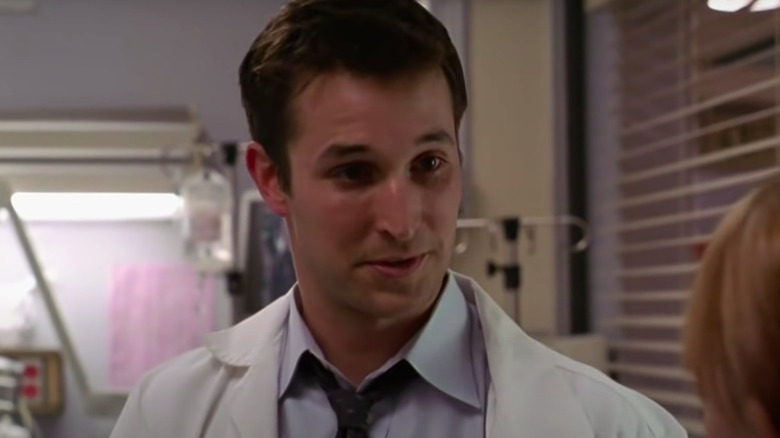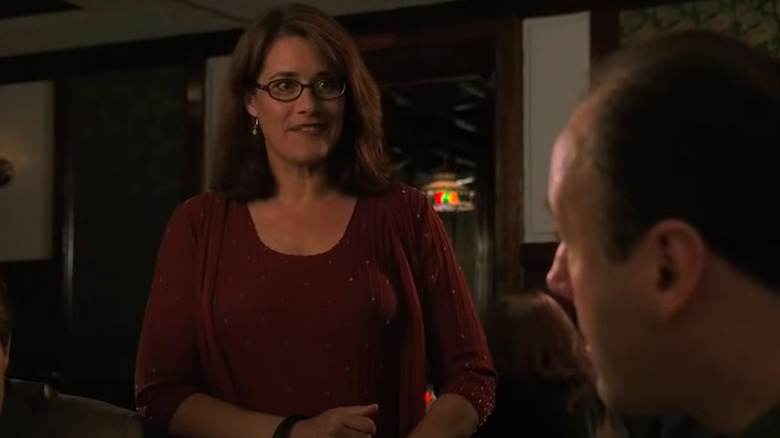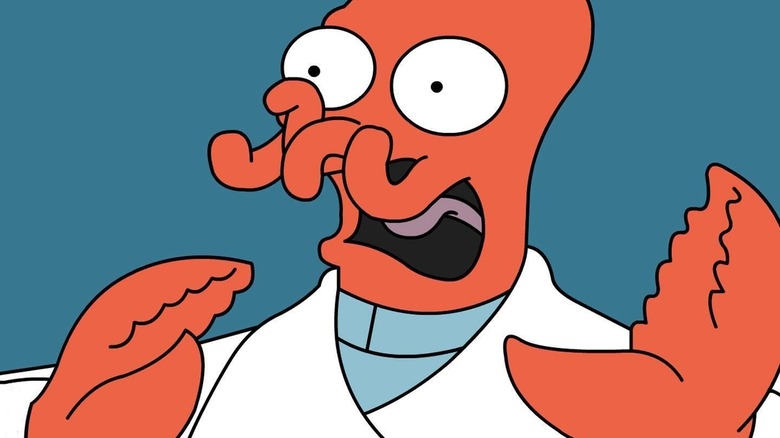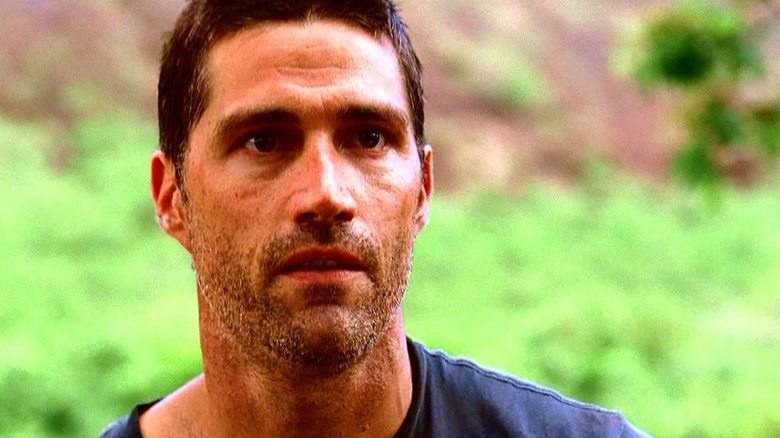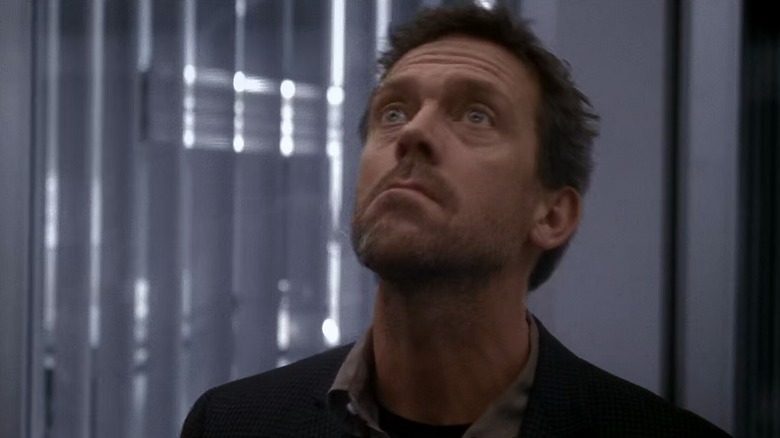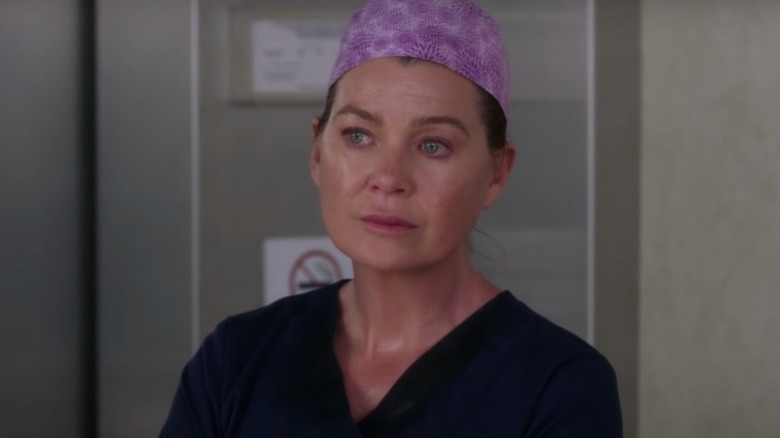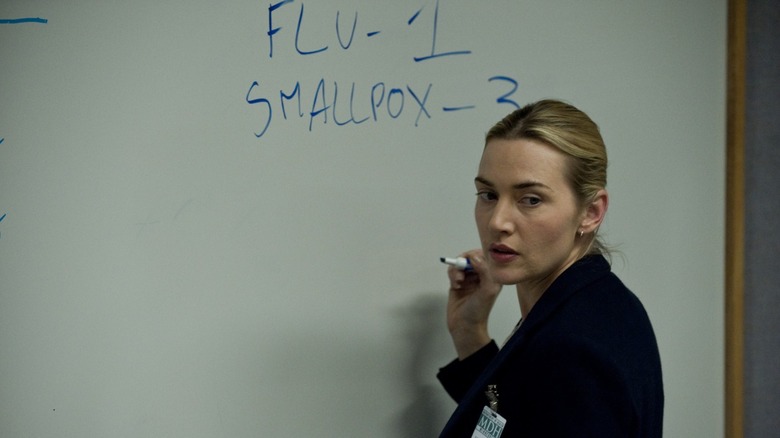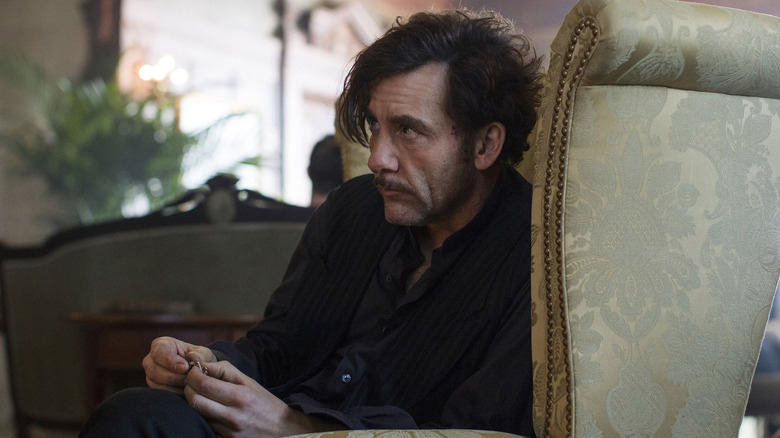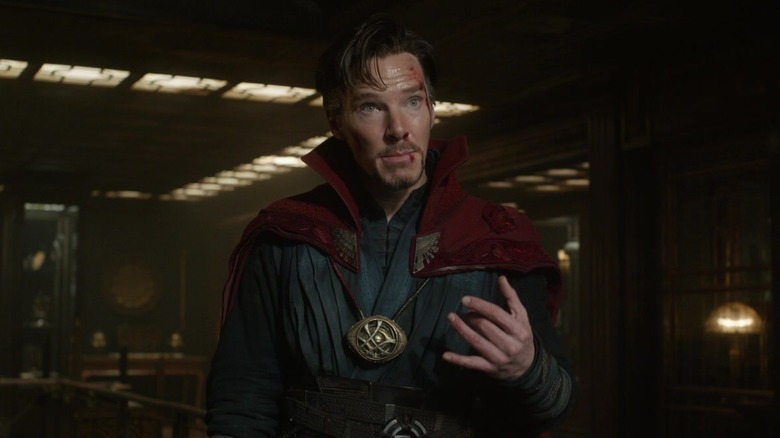The Most Memorable Doctors In Movie And TV History
Holding unique knowledge about what makes the human body tick, and sometimes literal power over life and death, medical doctors hold a unique place in our cultural consciousness, and thus in the stories we tell. It's easy to derive drama from the medical field, after all, given the stakes involved. Some doctors are regarded as heroes, saviors, or gurus, while others employ their medical knowledge for less savory endeavors, and come to be seen as frightening villains. And of course, as with all people, some stand solidly in the middle, flawed heroes or complex, realistic people.
For as long as there have been movies and television shows, no small amount of them have told stories about doctors. They may be the main focus, or just one member of a larger crew. Some heal patients, some solve mysteries, and some even kill people. So let's examine this broad spectrum as characters, as we journey through the history of TV and movies to look at some of the most memorable screen doctors of all time.
Richard Kimble
Richard Kimble was originally played by David Janssen, and first appeared when "The Fugitive" premiered on ABC TV way back in 1963. Kimble was a successful physician until his wife was murdered by a one-armed man. Kimble was the only one who saw the actual murderer, who left no physical evidence. Since the good doctor and his wife had recently been seen arguing, he was tried and convicted for this murder he didn't commit. The train that was meant to carry Dr. Kimble to death row derailed, giving him an opportunity to escape. The TV series followed Kimble as he traveled the country in search of the one-armed man, taking odd jobs under assumed names along the way, as the authorities continued to hunt him. No matter how perilous his own situation, he never stopped being a caring doctor at heart. As the series drew to a close in 1967, Kimble finally caught up to the real murderer and managed to clear his name.
In 1993, "The Fugitive" was remade as a feature film, with Harrison Ford playing Doctor Richard Kimble. Being structured as a movie instead of an episodic series, there was much less emphasis on Kimble traveling around taking menial jobs, and a lot more delving into the plot around his wife's murder. One of the most intense scenes of the movie, in which US Marshal Gerard (Tommy Lee Jones) confronts Kimble in the spillover tunnel of a dam, was so frequently quoted — "I didn't kill my wife!," "I don't care!" — that it became whatever the '90s version of a meme was. Even thirty years later, the hit movie is fondly remembered enough to keep the archetype of Doctor Kimble, created almost sixty years ago, alive in the public consciousness.
Yuri Zhivago
Even if you've never seen David Lean's 1965 film "Doctor Zhivago" (and who could blame you — it's more than three hours long) you've certainly heard it mentioned as a classic of cinema. The title character is Yuri Andreyevich Zhivago (Omar Sharif), a Russian physician and poet whose life in general, and love life in particular, was left in chaos by the Russian Revolution and subsequent Civil War. Serving as a battlefield doctor during World War I, Zhivago falls in love with his nurse, Lara Antipova (Julie Christie), even though he has a wife back home, Tonya (Geraldine Chaplin), and Lara has a husband as well, although he's missing in action.
Yuri Zhivago lives his life torn between these two women, even as Russia is torn apart by war and upheaval. With his poetry condemned as anti-communist by the new powers that be, Zhivago goes from respected doctor to penniless pariah. He fathers children by both women, but ends up with neither of them, and finally dies of a heart attack while chasing Lara, the great love of his life, down the street. She never even saw him. The film ends with Yuri's brother, NKVD Lieutenant General Yevgraf Zhivago (Alec Guinness), realizing that he has found Yuri and Lara's adult daughter Tanya (Rita Tushingham) and that his legacy lives on even if she never knew him.
Zachary Smith
When the TV show "Lost in Space" began in 1965, Doctor Zachary Smith (Jonathan Harris) was unambiguously the villain. A saboteur secretly working for an unnamed foreign government, Smith is responsible for throwing the Jupiter 2 off course and creating the titular situation. To back up slightly, the Jupiter 2 is a flying saucer-type ship meant to carry the Robinson family, along with a pilot named Don West (Mark Goddard) and a helpful Robot (Dick Tufeld), on a five year journey to colonize an Earth-like planet orbiting Alpha Centauri. After Dr. Smith messes everything up, however, the Robinsons and West find themselves unable to get back on course, visiting various strange planets and having weekly adventures.
Somehow, Smith avoids any real punishment for his actions, exploiting the endlessly forgiving nature of Professor John Robinson (Guy Williams) and also conveniently being the only medical doctor around in case of emergency. He spends much of the show's three seasons acting like the ship's babysitter, accompanying the youngest family member, Will Robinson (Bill Mumy) and the Robot as they find danger on each new planet where the Jupiter 2 lands.
In 1998, Gary Oldman played Doctor Smith in a new "Lost in Space" movie in which he was, once again, a more straightforward villain. The movie was unsuccessful, however, and even the acting chops of Oldman couldn't replace the campy histrionics of Jonathan Harris in the public imagination. In 2018, Parker Posey began playing an entirely new version of the character on Netflix's "Lost in Space" reboot. "Doctor Zoe Smith" was never actually a doctor, just a con artist with stolen credentials, but she played a similar role in evolving from villain to begrudging ally, even forming a similar friendship with Will and the Robot.
Leonard 'Bones' McCoy
In 1966, "Star Trek" introduced perhaps the most memorable doctor ever to ply his trade in outer space, Doctor Leonard McCoy (DeForest Kelley), nicknamed Bones by Captain Kirk (William Shatner). Along with science officer Mr. Spock (Leonard Nimoy), Bones and Kirk form a triad at the center of many of "Star Trek"'s best stories. Whereas Kirk represents passion, and Spock, logic, Bones always stands up for compassion and caring, despite often being quite grumpy about it. The various hostile alien environments, creature encounters, and of course space battles provided plenty of opportunities for Bones to ply his trade. In fact, one of the most quoted lines on the show to this day is Bones telling Kirk, "He's dead, Jim." Fortunately, Doctor McCoy was able to prevent as many deaths as he pronounced, and many episodes end in his sickbay, with the announcement that someone is going to be alright after all.
In addition to Karl Urban playing Bones in the three reboot movies, other "Star Trek" series have introduced other memorable doctors. Gates McFadden as Doctor Beverly Crusher was an important ingredient of "Star Trek: The Next Generation," and "Star Trek: Voyager," and wouldn't have been the same without Robert Picardo as the holographic AI doctor. On the current "Star Trek: Discovery," Wilson Cruz plays Doctor Hugh Culber, who has become an increasingly developed and complex character over the course of the series. Still, to this day, none of these doctors have been quite as memorable — or left as indelible a mark on pop culture — as Doctor Leonard McCoy.
Quincy
The title character of "Quincy, M.E." (whose first name is never revealed, although there are hints it's Richard) is a forensic pathologist who serves as Medical Examiner for the Los Angeles County Coroner's Office, played by Jack Klugman for eight seasons beginning in 1976. Quincy helps the police solve crimes, and, in fact, often solves them himself by examining bodies to determine the cause of death. While early episodes tended to be straight-up murder mysteries, later seasons often found Quincy coming up against social issues such as drunk driving laws, hazardous waste disposal, eating disorders, college hazing, teenage drinking, and so forth. One famous episode even sounded a warning about the dangers of punk rock music.
Quincy is a charismatic and slightly eccentric character. When he's not at the morgue, he lives on a sailboat in Marina Del Rey. A widower when the series begins, Quincy has several girlfriends over the course of its run. His investigations often bring him into conflict with his boss, Dr. Robert Asten (John S. Ragin), and LAPD Homicide Detective Frank Monahan (Garry Walberg), although a greater mutual respect gradually develops with both characters.
"Quincy, M.E." was extremely influential on future police procedurals, as it was the first show to really delve into how autopsies and forensic investigations work, and generally what can be learned from examining a dead body.
If you or anyone you know is struggling with addiction issues, help is available. Visit the Substance Abuse and Mental Health Services Administration website or contact SAMHSA's National Helpline at 1-800-662-HELP (4357).
Sam Loomis
Introduced in the 1978 horror classic "Halloween," Doctor Sam Loomis (Donald Pleasence) is a psychiatrist with many years already under his belt. What's strange, then, is that he arrives in Haddonfield, Illinois, not to provide psychological insight into his escaped patient, the murderous Michael Myers. Instead, Dr. Loomis comes to warn everyone that Michael is absolutely, irredeemably evil, and must be hunted down and killed before he murders more people. In fact, Loomis brings along a revolver to take out Michael himself, if necessary. That's not the attitude you expect from a medical doctor, especially not a psychiatrist, but Loomis's fear of Michael and dismissal of the killer's humanity serves to make Michael that much scarier.
Ultimately, it is the doctor's pistol that stops Michael Myers in that first movie, but the killer doesn't stay down for long, disappearing before the credits roll. Both killer and doctor would return in "Halloween II," which takes place later that same night, with Loomis still trying to track Michael down. After the unrelated interlude of "Halloween III: Season of the Witch," Pleasence would return as Doctor Loomis for three more sequels, bringing his total appearances to five. Pleasence died in 1995, the same year his final "Halloween" movie was released, so the next sequel established that he died offscreen.
In Rob Zombie's reboot movies, Malcolm McDowell plays Dr. Loomis, although he's not nearly as iconic in the role as Donald Pleasence (no shade on McDowell, who has several iconic genre roles of his own). In 2021's "Halloween Kills," a Pleasence lookalike appears briefly in a flashback to 1978, establishing the character's (and Pleasence's) continued importance to the franchise long after his death.
Captain Benjamin Franklin 'Hawkeye' Pierce
Just because you're a doctor doesn't mean you have to take life too seriously — even when you're in the midst of a literal war. Doctor Hawkeye Pierce works hard at his job and saves many lives as a surgeon in the Korean War, but along the way he also gets in the occasional round of golf, plays pranks, and tries to get laid when he can. Hawkeye was originally brought to screen in Robert Altman's 1970 film "M*A*S*H," where he was played by Donald Sutherland. Alongside his fellow memorably nicknamed army doctors Trapper John (Elliott Gould) and Duke (Tom Skerritt), Hawkeye has a series of misadventures in between shifts in the surgical tent. As the Vietnam War raged, viewers understood that Altman's unapologetically anti-war film was about more than just Korea.
Sutherland was a good Hawkeye, but the actor most associated with the role is Alan Alda, who played him on TV's "M*A*S*H" from 1972 until 1983. The anti-war sentiments had to be toned down for television, but they were still there, and often embodied by Alda's dry wit as Hawkeye. Other doctors on the series would come and go, such as TV's Trapper John (Wayne Rogers) being replaced by B.J. Hunnicutt (Mike Farrell) in Season 4. Hawkeye was at the center for all eleven seasons, however, and Alda's performance is synonymous not just with the series, but with the whole pop cultural idea of a military surgeon.
Frasier Crane
When Doctor Frasier Crane (Kelsey Grammer) was introduced in the Season 3 premiere of "Cheers" on NBC in 1984, nobody could have guessed that the character would be on television for twenty years. A culturally sophisticated psychiatrist, Frasier was introduced as a romantic rival to Boston bartender Sam Malone (Ted Dansen) for the affections of Diane Chambers (Shelley Long), an academic turned barmaid. By the time his relationship with Diane runs its course in Season 4, Frasier has become a regular at the bar and friends with the rest of the characters, so it makes sense for him to stick around. He often draws upon his education to offer psychological insights to the employees and other patrons, some of which are more accurate than others. He eventually marries another psychiatrist, Lilith Sternin (Bebe Neuwirth), and they have a son before splitting up in the final season.
When "Cheers" ended in 1993 after eleven seasons, Kelsey Grammer starred in a spinoff, "Frasier" which would run for another eleven seasons on NBC. The show finds Frasier in Seattle, having left Boston and the Cheers bar behind after his divorce, where he lives with his retired cop father Martin (John Mahoney) and takes a job hosting a radio call-in show, where he offers psychological advice over the airwaves. "Frasier" also introduces a younger brother, Niles Crane (David Hyde Pierce), who is also a psychiatrist and occasionally makes fun of Frasier for abandoning traditional practice in favor of the radio.
Elliot and Beverly Mantle
In David Cronenberg's 1988 psychological horror film "Dead Ringers," Jeremy Irons plays a dual role as identical twins Beverly and Elliot Mantle. Both twins are gynecologists, and they have a successful joint practice specializing in fertility problems. Elliot is a confident, outgoing womanizer, while Beverly is much more shy and passive. In fact, Elliot has a habit of picking up women and then passing them off to Beverly when he gets bored. The women are often left unaware of which brother they're actually sleeping with. When this happens with an actress named Claire Niveau, however, Beverly falls in love, which throws his relationship with his brother out of balance. From there, things spiral downward into drug abuse, hallucinations, disturbingly alien gynecological tools, and worse.
Cronenberg's movies often obsess over bodies and identity, so it's no surprise that this one focuses on two men, who almost blur together into one character, and who regard themselves as experts on what goes on inside women's bodies. "Dead Ringers" is far from a typical medical thriller, and it takes its viewers on an unsettling journey with a pair of deeply weird doctors they won't soon forget.
Doogie Howser
These days everybody knows Neil Patrick Harris as a song-and-dance man, celebrity's celebrity, and gay role model, but he got his start playing a doctor on TV at a much younger age than most. From 1989 until 1993, Harris starred as the title character in "Doogie Howser, M.D.," a sitcom about a teenage doctor. Doogie (short for "Douglas") is a child prodigy with a genius intellect who completed medical school at the age of 14. The series begins on his 16th birthday, when he's a second year resident surgeon at a Los Angeles hospital. He still lives with his parents and has friends his own age, but he often struggles to fit in both with other teens and other doctors, for obvious reasons.
The series focused on Doogie coming of age and developing his own sense of morality as all teens do, but with the added dimension of facing the life and death decisions that come with being a doctor. There was no shortage of "very special episodes," dealing with issues such as access to medical care, AIDS, homophobia, racism and so forth. At the end of each episode, Doogie would type an entry in his computer journal (his words provided for viewers in voiceover, of course), reflecting on the lessons he'd learned that week.
In 2021, Disney+ launched a loose reimagining of the series called "Doogie Kameāloha, M.D." This time the teenage doctor is Lahela Kameāloha, a Hawaiian girl who works at an Oahu hospital. In this series, "Doogie Howser, M.D." exists as a classic TV show, with Lahela receiving the nickname "Doogie" because she's a teenage doctor like the TV character.
Malcolm Sayer
The 1990 film "Awakenings" is based on a memoir by the renowned neurologist Dr. Oliver Sacks, but it's fictionalized enough that the character based on him is a distinctly different person, with a different name. In 1969, Dr. Malcolm Sayer (Robin Williams) is working with patients who've been catatonic for decades, since the 1917–1928 epidemic of encephalitis lethargica. He experiments with a new drug called L-Dopa, and finds that it brings these patients out of their catatonia entirely, starting with Leonard Lowe (Robert De Niro). Finding himself awakened to a whole new life, Lowe is at first enchanted by the world around him, and then begins to feel restricted by the hospital that still considers him a patient. Sayer is thrilled by the drug's success, but then heartbroken when that success proves temporary. Despite continued doses of L-Dopa, Lowe sinks back into catatonia, and the other patients follow soon after.
Dr. Sayer is ultimately inspired by the experience, which changes how the medical staff interacts with the catatonic patients, who they now see as full-fledged people in a way they didn't before. The experiment with L-Dopa wasn't really a failure, even if it didn't lead to the permanent success he had hoped for.
Joel Fleischman
The central character of "Northern Exposure," Joel Fleischman (Rob Morrow) is a Jewish doctor from New York City who's never imagined life outside of that urban setting. When he was in medical school, he accepted a student loan underwritten by the state of Alaska in return for a requirement that he practices medicine for four years in the northernmost U.S. state. He expects to work at a hospital in Anchorage, but finds himself instead assigned to be a general practitioner in the tiny town of Cicely. There he finds himself the proverbial fish out of water, adjusting not just to rural life in the Far North, but to the unique eccentricities of Cicely and its residents. For example, his receptionist is Marilyn Whirlwind (Elaine Miles), a Native Alaskan woman whose quiet serenity is a stark contrast to Joel's nervously verbose Jewish NYC manners.
"Northern Exposure" ran for six seasons beginning in 1990, giving Joel plenty of time to get to know the people of Cicely and develop relationships with them. The series also had a streak of magical realism, with unexplained events serving to teach the characters lessons. When Morrow left the show during the last season, it ironically wasn't to return to New York, but to travel even deeper into the wilderness in search of spiritual enlightenment. Unfortunately, the show wasn't the same without him.
Hannibal Lecter
Perhaps no fictional doctor has ever been more dangerous than Hannibal Lecter. Originally introduced in a series of novels by Thomas Harris, Dr. Lecter first came to the screen in the 1986 film "Manhunter," played by Brian Cox. He first became an indelible part of popular culture, however, with the 1991 film "The Silence of the Lambs," in which he's played by Anthony Hopkins, who won an Oscar for the role. Hopkins would return as Lecter in a sequel, "Hannibal," and a prequel, "Red Dragon." Lecter gained a new generation of fans in 2013, when Mads Mikkelsen took on the role for the TV series "Hannibal," which ran for three seasons on NBC.
Hannibal Lecter is a brilliant psychiatrist with a nuanced understanding of the human mind as well as the body that holds it. He's also a serial killer and a cannibal. An aesthete and a gourmet chef, Lecter kills people he sees as rude or uncouth, and then incorporates parts of their bodies into exquisitely prepared food, which he sometimes serves to unsuspecting friends and colleagues. The most frightening thing about Dr. Lecter, however, is his ability to manipulate people using his charisma and psychological insight, sometimes with the aid of drugs.
The Hannibal Lecter movies take place after his crimes have been discovered and he's been imprisoned in a high security institution. The "Hannibal" TV series, however, begins when he's still a respected psychiatrist and member of Baltimore's cultural elite. In both versions, his knowledge of the mind is as unnerving as his horrific crimes.
Jed Hill
If you've never seen the 1993 thriller "Malice," you may remember a bit on the sitcom "30 Rock" when Alec Baldwin as Jack Donaghy goes to confession, and among his other sins he tells the priest, "I once claimed 'I am God' during a deposition." That joke is a direct reference to "Malice," in which Baldwin's character Dr. Jed Hill does exactly that. What's wild about the 1993 film is that the deposition where Hill declares himself God happens pretty early in its runtime, and things just get bigger and crazier from there.
Dr. Hill is a deeply corrupt and immoral surgeon, but he's not actually the megalomaniac that his famous line implies. He turns out to be tanking the deposition on purpose, as part of a scam to get a share of the $20 million malpractice settlement that his insurance company will be forced to pay to his patient. That's only one small element of the unbelievably twisty plot of this over-the-top mystery that co-stars Nicole Kidman and Bill Pullman. Jed Hill isn't a doctor you'd want operating on you (or renting a room in your house, as Pullman's character learns the hard way), but he's a character you won't soon forget once you've seen this deeply weird movie.
MIchaela Quinn
"Dr. Quinn, Medicine Woman" was a unique western series that aired from 1993 until 1998. The title character Michaela Quinn, played by British actress Jane Seymour, is a physician who moves from Boston to Colorado Springs in 1867, where she finds people quite surprised to learn that a woman can even be a doctor, let alone a good one. As the only doctor in the frontier town, however, she eventually wins people over.
Among her first allies is Byron Sully (Joe Lando), a white outdoorsman who has adopted much of the culture of the local Cheyenne tribe with whom he's developed a close relationship. Both of them face cultural prejudices from many of the locals, leading to a swift closeness between the two, which soon blossoms into romance. Doctor Mike, as she's often called, also befriends the local midwife, Charlotte Cooper (Diane Ladd), and ends up with custody of her three children after Charlotte is bitten by a rattlesnake and passes away.
Airing on Saturday nights, "Dr. Quinn" was popular with families, with the title character serving as a positive role model for girls and the rustic setting providing plenty of action. Almost three decades after the series began, Michaela Quinn remains an iconic character, and one of the most iconic old west doctors ever on television.
Special Agent Dana Scully
Dana Scully, played by Gillian Anderson on "The X-Files," is best remembered as an FBI agent who investigates aliens and various supernatural phenomena alongside her partner Fox Mulder (David Duchovny) across nine original seasons, two movies, and two reunion seasons. Everyone who watched "The X-Files," however, remembers that Scully is also a medical doctor, which comes up in nearly every episode of the show. She often performs autopsies on people who've died under mysterious circumstances, as well as providing medical aid to living victims of the various creatures and super-powered weirdos that she and Mulder encounter. Her family, it turns out, is also judgmental of her choice to join the FBI rather than using her medical degree in a more lucrative and less dangerous manner.
Even when she's not directly putting her medical skills to use, being a doctor is inextricable from Dana Scully's personality and how she conducts the X-Files cases. She approaches the people involved in those cases with care and a desire to help. She treats the mysteries diagnostically, often employing a scientific method in contrast to Mulder's intuitive and sometimes credulous approach. Basically, being a doctor makes her a better FBI agent, as well as a more memorable character.
John Carter
Obviously a medical drama like "ER," which ran from 1994 until 2009, had a great many doctors among its constantly evolving ensemble of characters. For example, George Clooney had his big career breakthrough playing pediatrician Doug Ross for the first five seasons, before leaving for his movie career. Anthony Edwards played Dr. Mark Greene for eight seasons, and Eriq La Salle played Dr. Peter Benton for just as long. Maura Tierney joined the cast in Season Six as Dr. Abby Lockhart, as does Goran Visnjic as Dr. Luka Kovač. This is still only scratching the surface of the doctors who spent time in the emergency room of Chicago's fictional County General Hospital over the show's fifteen seasons.
If one character really stands out from the pack, however, it's John Carter, played by Noah Wyle. The premiere episode of "ER" tells the story of Carter's first day at County General as a third-year medical student from a wealthy family. The first eleven seasons of the series follow Carter as he graduates and becomes a full-fledged doctor. He also struggles with drug abuse, has multiple romantic relationships, marries, loses a child, and creates an AIDS clinic. After appearing as a guest star in Season 12 and being entirely absent from Seasons 13 and 14, Wyle returns as Dr. Carter for five episodes of the 15th and final season, allowing the series to end with the character it began with fifteen years earlier.
Jennifer Melfi
In the first episode of HBO's "The Sopranos," which basically kicked off the era of prestige TV back in 1999, mob boss Tony Soprano (James Gandolfini) reluctantly decides to see a psychiatrist following a series of panic attacks. As he later explains, Tony instinctively picks a doctor with an Italian name, which leads him to Doctor Jennifer Melfi (Lorraine Bracco). Although he does his best to be vague about his criminal enterprises, it doesn't take Dr. Melfi long to figure out what her new patient does for a living, and the complexity of a relationship between a criminal and his therapist forms a narrative backbone of the series.
Although Tony's therapy sessions become less central to the show over time and he sometimes stops seeing Dr. Melfi for various reasons, she remains a major character in the show, and viewers gradually gain more insight into her life, as well as how her sessions with Tony weigh on her sense of ethics. Eventually we even see some of Melfi's sessions with her own therapist, Dr. Elliot Kupferberg (Peter Bogdanovich), who frequently discourages her from continuing to treat Tony. Nevertheless, she works with Tony for seven years, only ending their sessions for good (as far as we know) in the next to last episode of the series.
John A. Zoidberg
John A. Zoidberg (usually just referred to by his last name) is the staff doctor at Planet Express, an intergalactic delivery company in the 31st Century. Voiced by Billy West on "Futurama," Zoidberg is a lobster-like humanoid from the planet Decapod-10. Despite his medical degree, he's largely ignorant of human anatomy, but insists on treating humans anyway. Nevertheless, he occasionally performs amazing feats of futuristic medicine, like transplanting Philip Fry's living head onto Amy Wong's body, but at other times, he can't even tell if someone is alive or dead.
Basically, "Futurama" is an absurd comedy, and Zoidberg's skills depend on what's funniest from moment to moment. West voices Zoidberg with a noticeable Yiddish accent, and many of the jokes involving him and his people reference Jewish culture, all of which amounts to a meta-joke about the fact that lobster isn't kosher. Zoidberg is usually regarded not just as an incompetent doctor, but also a pathetic loser, with no real friends and sometimes no home. Nevertheless, he is a central (if not exactly "valued") member of the Planet Express team, and takes part in many of their missions over the course of the long-running series and various made-for-TV movies. He may not be the best doctor in animation, but he's probably the funniest.
Jack Shephard
Doctor Jack Shephard (Matthew Fox) is one of the central protagonists of "Lost," the hit sci-fi action series that ran from 2004 until 2010. A successful Los Angeles doctor, Jack is returning home with the body of his father, who died in Australia, when the plane crashes on an uncharted island in the first episode of the series. Jack's medical skills help several of his fellow passengers survive after the crash, so the group begins looking to him as a leader. He's reluctant to take on that role at first, but eventually comes to realize it's what he's meant to do. Plus, the constant dangers of the island mean that his abilities as a healer are needed almost constantly.
As a skeptic with a rational worldview, Jack has a hard time accepting the supernatural aspects of the mysterious island, but over time his outlook inevitably changes. Even after he and several others are rescued from the island and make it back to civilization, Jack comes to realize that it's their destiny to return there. By the end of the series, Jack not only returns to the island, he's willing to sacrifice himself to save it.
Gregory House
"House," which ran for eight seasons starting in 2004, is a rather unusual medical drama. It's structured more like a police procedural or mystery series, in which an eccentric doctor leads a team of diagnosticians in investigating mysterious ailments that have the rest of the hospital stumped. That lead doctor is Gregory House, played by Hugh Laurie. Doctor House is a grump and a misanthrope, not to mention an unapologetic drug addict. Based in part on Sherlock Holmes (his last name is a pun on "Holmes"), House has no bedside manner and little regard for his patients, but is fascinated by the mystery of what's wrong with them. He walks with a can and suffers chronic pain due to a leg infarction, which led to his dependence on painkillers.
The character of House raises questions about what makes a "good" doctor. He rarely seems to care about anyone, but his intellect nonetheless saves many lives. He also serves as a mentor to the young doctors on his diagnostic team, although he rarely seems to care how he treats them either. Despite his surly demeanor, House has an undeniable charisma, which contributed to the long-running show's popularity.
If you or anyone you know is struggling with addiction issues, help is available. Visit the Substance Abuse and Mental Health Services Administration website or contact SAMHSA's National Helpline at 1-800-662-HELP (4357).
Meredith Grey
Doctor Meredith Grey, played by Ellen Pompeo, is the title character and protagonist of "Grey's Anatomy," a medical drama that's been running since 2005. Although she's surrounded by an ensemble of other doctors and hospital staff, other characters come and go while Meredith has been at the center of things for eighteen seasons and counting. In fact, as of this writing, Pompeo has already agreed to return for Season 19. It's a rare thing (at least outside of animation) for one character to be played by the same actor in prime time for nearly two decades, which means fans have really seen Dr. Grey grow and mature over the years.
Meredith is the daughter of Ellis Grey (Kate Burton), a renowned surgeon whose reputation cast a long shadow over Meredith's career, especially early on. Ellis was also a neglectful, judgmental, and verbally abusive mother, leading Meredith to grow up with a cynical worldview. She even doubted whether she wanted to follow in her mother's footsteps and become a doctor, but changed her mind after Ellis was diagnosed with early-onset Alzheimers. As "Grey's Anatomy" begins, Meredith is starting out as a surgical intern at the fictional Seattle Grace Hospital. On her first day there, she discovers that a guy she recently slept with, Derek Shepherd (Patrick Dempsey) is the new Head of Neurosurgery. In time, Meredith becomes a surgical resident, then an attending physician, and in 2016, the Chief of General Surgery over the entire hospital. Along the way, her relationship with Dr. Shepherd evolved as well. The two married in 2009, but he died in 2015, while Meredith was carrying their third child. In short, Meredith Grey has lived an entire life on our TV screens, and saved countless lives as a surgeon along the way.
Erin Mears
2011's "Contagion" is a medical thriller about a deadly viral pandemic that breaks out in the United States to a degree that had never really occurred when the movie was released. When the very real COVID-19 pandemic began in 2020, many people revisited and discussed "Contagion" as relevant and even prophetic, although the fictional virus in the movie is considerably deadlier than COVID-19.
Naturally, there are many doctors among the film's large cast of characters, but the one you'll never forget is Erin Mears, played by Kate Winslet. An Epidemic Intelligence Service officer for the CDC, Dr. Mears is sent to Minneapolis, where people first started getting sick, to trace the spread of the virus. She basically plays the role of a medical detective, tracing the movements of patient zero, Beth Emhoff (Gwyneth Paltrow), and tracking down everyone she's had contact with. As successful as she is in her investigation, she also becomes infected herself, and dies without being able to return home. A martyr in the truest sense, Dr. Mears is instrumental in the CDC's handling of the virus, which eventually leads to a vaccine.
John W. Thackery
"The Knick," which began in 2014, is an unusual medical drama in that it's also a period piece, set at the Knickerbocker Hospital in New York City in the year 1900. Clive Owen stars as Doctor John Thackery, who is promoted to Chief Surgeon in the premiere episode, when his mentor Dr. Christiansen (Matt Frewer) commits suicide after the two of them fail to save a pregnant woman and her child. Loosely based on a historical surgeon named William Stewart Halsted, Thack is an innovator in the field of medicine, developing new surgical techniques and saving lives that were previously considered lost. He's also a drug addict, taking cocaine in the daytime and opium at night. He serves as a reluctant mentor to Dr. Algernon Edwards (André Holland), a highly educated and extremely qualified surgeon who nevertheless faces constant prejudice because he's Black.
A talented doctor who's also addicted to drugs is a well-worn trope at this point, but Thack's historical context and constant desire to innovate within it makes him memorable, and the series truly unique. The medical and technological limitations of the time are a constant problem for Thack and his colleagues. The installation of electricity at the Knickerbocker is a subplot of the first episode, for example, and then in the second episode, a short circuit kills a nurse and sets a patient on fire.
"The Knick" was canceled after two seasons, although there has since been talk of reviving it. If it does return to TV, Clive Owen won't be involved. Ever the innovator, Dr. Thackery died in the final episode of Season 2, in the act of performing surgery on himself.
If you or anyone you know is struggling with addiction issues, help is available. Visit the Substance Abuse and Mental Health Services Administration website or contact SAMHSA's National Helpline at 1-800-662-HELP (4357).
Stephen Strange
As played by Benedict Cumberbatch in 2016's "Doctor Strange," Stephen Strange is a successful, and very self-involved neurosurgeon in Manhattan, until a car accident leaves him with nerve damage in his hands and he can no longer operate. Desperate for a cure, he finds his way to a secret order of sorcerers led by The Ancient One (Tilda Swinton). At first he only wants enough magic to heal his hands, but in time he finds a greater purpose in learning magic and taking up The Ancient One's mission of protecting Earth from extra-dimensional threats. He's soon back in New York City, as the guardian of a mystical sanctum.
After his introductory film, Dr. Strange became a central figure in the Marvel Cinematic Universe, appearing in "Thor Ragnarok," "Avengers: Infinity War," "Avengers: Endgame," and "Spider-Man: No Way Home," all on the way to his own 2022 sequel, "Doctor Strange in the Multiverse of Madness." His training as a medical doctor rarely comes up since his role in these stories revolves around magic and mysticism, but he's still the most prominent doctor in the MCU, as well as the most prominent sorcerer. Since the MCU is currently so dominant in pop culture, that makes him one of the most prominent doctors in media.
